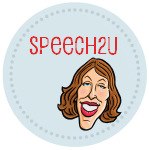Praxis refers to motor planning problems. I have a LOT of motor planning problems and would have benefitted greatly from occupational therapy as a child.
For example, I'm pretty sure I was still riding my Big Wheel into grade school because I couldn't ride my bike. And I once made the mistake of jumping out of a pedal boat to use the lake's facilities. Only to realize that I couldn't figure out how to climb back into the boat. My friend and I pulled the boat while swimming and tried to wave down other boaters-but they just waved back. I think we were swimming for at least 30 minutes before some kids told their parents they thought we were in trouble (I was...) and the parents rescued us. I made myself practice climbing onto the dock for the rest of the afternoon and was finally able to figure out how to get up onto the pedal boat the next day. You are probably picturing a cute 10 year old Speech2U. But really I was 32.
Anyhow, I find motor planning and praxis interesting. The article is focused on Ideation which is defined as the ability to know what to do with things. For example, I can look at a ball and know that I can throw it, kick it, bounce it, roll it, sit on it, put it under my shirt to pretend I'm pregnant, or play catch with it. Theresa May-Benson is proposing that some children may have problems with Ideation which impairs their ability to interact with new objects in different ways. This is different from a child with motor planning deficits who knows what they would like to do but can't figure out exactly how to do it.
These children are described as children who often sit out of activities, stand and watch others or refuse to participate in different play activities. They may be the kids who say, "I don't know" when asked how to play a game OR when asked what they want to do. It sounds similar to the planning and initiation deficits described in Executive Function disorders.
What was really interesting to me was the idea that language is an integral part of the ability to initiate motor actions. So the question becomes, is it that the child doesn't know what to do with the object-or is it that the child lacks the language to help him conceptualize what to do with the it? May-Benson suggests "Using a conscious language-driven approach to expand and generalize the child's semantic knowledge of possible object-action interactions provides an additional avenue for ideation" (page 174). She suggests clinicians can help their clients improve their ideation by mapping in language during gross motor activities "For instance, the clinician might help the child analyze a swing: "Sam this swing is on a stretchy cord. It goes up and down. What could we do with it?" (page 174).
So what does this mean for us as Speech Language Pathologists? First, it gives me some ideas of how I can map in language if I am doing a cotreat with OT. Second, I think it reiterates the importance of teaching a variety of object functions vs. just one. Maybe the long term goal for an object function goal is to describe 5 different ways that you can use it. It also reminds me of the importance of teaching actions and helping my clients describe WHAT they are doing in the most descriptive terms. Last, I think it reminds me to teach object characteristics. For example, you could pull out a variety of objects and have them tell you what they THINK it will feel like. Will it be heavy or light? If it is heavy how do you need to pick it up?
What do you think? Is this information you could use in your sessions?









No comments:
Post a Comment